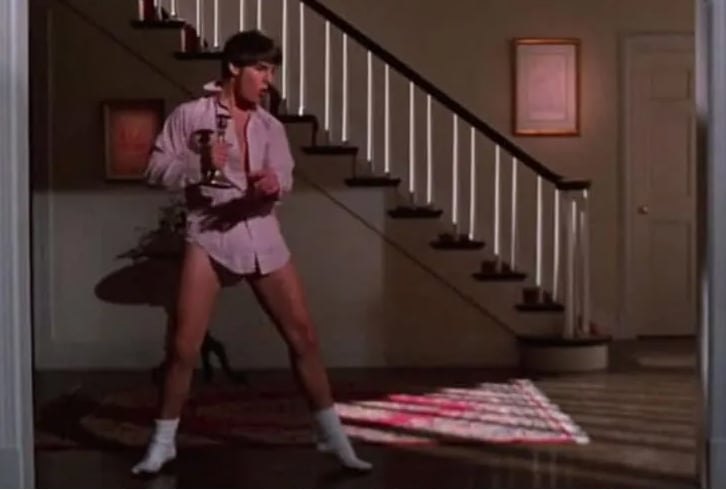Risky Business, the classic 1983 film starring Tom Cruise, will be re-released in June as part of the prestigious Criterion Collection. The ad copy reads that Risky Business is “a sly piece of pop subversion” and an “irresistible satire of Reagan-era materialism.” It “features Tom Cruise in his star-is-born breakthrough as a Chicago suburban prepster whose college-bound life spirals out of control when his parents go out of town for the week and an enterprising call girl (Rebecca De Mornay) invites him to walk on the wild side.” Make no mistake: this movie is “a sharp-witted capitalist critique that remains fresh and daring.”
Is it though? Risky Business, in fact, is less a critique of capitalism and more a conservative morality tale about not letting a wicked and conniving hooker play you for a fool. Despite the misleading ad copy, the Criterion Collection re-release will feature a new ending that underscores the film’s true meaning.
Most people know the plot: a high schooler named Joel Goodsen uses his parents’ house as a brothel while they are out of town. He gets rich, gets into Princeton, and—the film suggests—goes on to live the American Dream. Aided by a prostitute named Lana (Rebecca De Mornay), who eventually becomes his girlfriend, Joel has gone from awkward average student to a guy who has it all.
Yet in the writer-director Paul Brickman’s original vision, Joel is a kid who gets used by criminals and loses his soul. What’s interesting about the coming New Criterion edition of Risky Business is that it will feature an alternate ending to the film. In the original script, Joel doesn’t get the girl, doesn’t get into Princeton, and breaks a crystal egg that is his mother’s most prized possession. Brickman saw Joel’s story as a tragedy rather than a triumph. “No one knew what kind of tone I was working toward,” he said in an interview years later. “No one thought it was funny enough.” Brickman described himself as a fan of J.D. Salinger, whose The Catcher in the Rye explored a young prep school kid having a mental breakdown.
In Brickman’s cut, the film ends with Joel and Lana out to dinner and having a conversation. Joel asks her about their sexual encounter: “Was that all a setup?” She pauses for a second and then replies, “No.” After another pause, she reads his face. “You don’t believe me, do you?” Joel then tells her to come sit on his lap. He has become as manipulative and cynical as she is. He doesn’t even care about love. He has become a devil. End.
This is a brilliant and brave telling. It opens the possibility that Joel was just a rich suburban mark for Lana and her criminal friends all along. Decades before the abuses of #MeToo, Risky Business argued that women are capable of being heartless, cunning, dishonest, and greedy. Of course, Hollywood executives insisted on something different. They wanted Joel to get everything he wanted, to get the girl, fix the house, and head to the Ivy League. Producers decided to have the film close out with happy dialogue between Joel and his hooker girlfriend as they walk through the park. “Time of your life, huh, kid?” she says.
Brickman was appalled: “I felt the whole film was compromised by this cheesy happy ending. I came very close to walking off the film.” Brickman was so bitter he did not direct another film until 1990.
It’s a tiresome trope of leftists to equate capitalism with prostitution when the problem was always just as bad if not worse in communist countries. In her academic paper “Selling sex under socialism: prostitution in the post-war USSR,” scholar Siobhán Hearne notes that brothels allegedly were eliminated in the USSR after the 1917 revolution: “The Soviet government claimed that prostitution had been eradicated because state socialism had eliminated the need for women to earn money through selling sex, but, in reality, state policy and the conditions of Soviet socialism actually made prostitution economically advantageous and even necessary for many women.”
When it came to prostitution, the Communists did what they always did: they lied. While claiming that prostitution was a vice inherent in capitalism and therefore eradicated under socialism, in fact, writes Hearne, “prominent early Soviet politicians invested in the idea that there were two types of women who sold sex: those who did so to escape poverty and ‘hardened’ or ‘malicious’ professionals, who could never integrate into Soviet society.”
“Hardened and malicious” describes Lana and her crew of pimps and hookers in Risky Business. Rebecca De Mornay is excellent in the role, playing it with exactly the right cool edge. Even when hugging an obviously distraught Joel, she seems aloof and unfeeling. She is exactly the kind of woman who would bear false witness against Joel if it meant a payday. Risky Business isn’t a sly indictment of capitalism. It’s a warning about crazy women and the power of sex to destroy men. Considering what has happened in our politics over the last couple decades, the film was far ahead of its time.

Leave a Reply